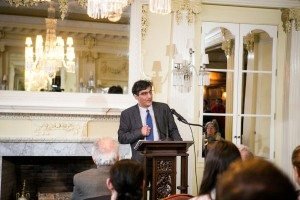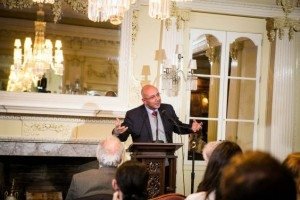By Sarah Newell and Ivy Tran
BOSTON, Mass.—On Wednesday evening, March 26, Rouben Shougarian and Armen Baibourtian, former ambassadors of post-Soviet Armenia, spoke at the Kenosian Chair Current Issues Series, “The United Nations, Armenia, and the Sovereignty of Nagorno-Karabagh,” at Boston University’s (BU) Castle.
Professor Simon Payaslian, Charles K. and Elisabeth M. Kenosian Chair in Modern Armenian History and Literature at Boston University, invited these prominent figures in Armenian diplomacy to participate in the event, which was co-sponsored by the departments of history and international relations at Boston University, as well as the National Association for Armenian Studies and Research (NAASR). The speakers discussed the role of the United Nations in Armenia, Armenia’s foreign policy, and national sovereignty issues in the Karabagh conflict, and related them to the current Crimean crisis.

The first speaker, Ambassador Shougarian, served as Armenia’s first ambassador to the United States (1993-99), as deputy foreign minister (1999-2005), and as ambassador to Italy, Spain, and Portugal (2005-08). He also worked for the Armenian Parliament’s Standing Committee on Foreign Affairs and acted as a senior foreign policy aide and spokesperson for former President Levon Ter-Petrosyan. Holding an MA with honors from Yerevan Linguistic University, Shougarian currently lectures at Tufts University’s Fletcher School of Law and Diplomacy. He is the author of two books, West of Eden, East of the Chessboard (2010) and The Politics of Immaculate Misconception: The Ides of the Post-Secular Age (2013), in addition to numerous articles addressing conflict resolution and the Black Sea region’s geopolitical identity.
Shougarian began his speech by recognizing how “the last decade brought about tectonic geopolitical changes” for Nagorno-Karabagh, and discussed the impact these changes had on issues pertaining to national sovereignty. He went on to say that the region’s sovereignty is intertwined with the problems facing other former Soviet territories. Shougarian further linked these problems to the current crisis in Crimea.
“The concept [of sovereignty] has to be redefined,” he stated. The issue requires rethinking the philosophy and changing our mindsets. The current definition of sovereignty, he argued, implies autonomy, but “no nation is autonomous.” Countries always depend on one another for support and security.
Sovereignty as it exists now is “as useless as a unicycle—one can ride on it, but not well,” he said. Therefore, we must rethink this definition to avoid double standards and to stop measuring ethno-territorial conflicts with the same yardstick. Instead, the international community should adopt the idea of what Shougarian called “remedial sovereignty,” which he defined in four ways: sovereignty yielded by the center to peripherals, sovereignty granted by an international body to an ethno-territorial unit, sovereignty earned and defended by the region itself, and sovereignty claimed by an intervening outside party.
Shougarian also acknowledged that a region’s sovereignty must first be achieved, granted, or recognized in order to be remedied, an observation that certainly applies to the current Crimean crisis.

Ambassador Baibourtian spoke next, expanding on the evening’s theme of national sovereignty. With PhDs in international studies and modern world history, Baibourtian currently teaches at the University of Massachusetts in Amherst. He previously served as senior adviser to the UN resident coordinator in Armenia, where he developed and coordinated the UNDP “Global Armenia” program. Baibourtian also acted as deputy foreign minister of Armenia (1997-2000 and 2004-08) and Armenia’s chief negotiator with the European Union (2005-06). His served as the first Armenian ambassador to India, Nepal, Sri Lanka, and Indonesia (2000-04), and as Armenia’s first consul general in Los Angeles (1995-97), as deputy permanent representative of Armenia to the United Nations, and as foreign policy advisor to the speaker of the Armenian Parliament (1991-92).
“The UN is important to Armenia not only because of the scale or magnitude of its operations, but also for its targeted development policies in the country, its wider partnership approach in devising projects, and its functions of donor coordination,” Baibourtian argued. He asserted that although the United Nations as a system planned to contribute a relatively small amount of $72 million to Armenia through its UN Development Assistance Framework for 2000-15, the UN programs are marked by their effectiveness and efficiency.
Describing the UN as a global network that applies in Armenia the “best practices in the existing world,” the diplomat offered examples of the UN’s aid in Armenia. The organization, he said, works with the Armenian government to help college graduates find employment by placing them in internships and training in private and public companies, to develop proper mid- and long-term budgeting and to implement modern, secure integrated border management. Baibourtian held that “the principle of the UN’s work in Armenia is not just cooperation, but forging partnerships” in addressing numerous challenges; for instance, soft securities issues like the introduction of border management on its northern borders with Georgia.
According to Baibourtian, the UN does not have a presence in Nagorno-Karabagh and is not able to assist in addressing the humanitarian needs of its population due to the politicization of the issue. Without the consent of Azerbaijan, the UN cannot extend its assistance to the people in need even during natural disasters. He mentioned that a consortium of five European NGOs implements EU-funded peace-building projects in Karabagh to help build mutual trust across the dividing lines. He stressed that the unresolved conflict remains one of the world’s “most dangerous.”
The Karabagh conflict invokes two major and contending principles of international law: self-determination and territorial integrity. While this tension manifests itself in Karabagh as Armenia invokes the principle of self-determination and Azerbaijan cites the principle of territorial integrity, Baibourtian reminded his audience that this ideological collision has occured repeatedly throughout history.
But what international examples can lead to a peaceful resolution for Karabagh? “Precedents in international law are considered binding,” he noted. Instead, the dominant international attitude is based on a case-by-case approach to each conflict.
In the question and answer session, Payaslian addressed one of these difficult cases, asking what the long-term implications of the Crimean crisis would be for Armenia. Shougarian answered that in the worst-case scenario, the Organization for Security and Co-operation in Europe (OSCE) would cease to exist, which, he warned, “should never be allowed to happen.” More positively, a successful resolution could set an example of self-determination reached by national referendum for Karabagh.
Either way, the situation is a “double edged sword,” according to Shougarian. While it could inspire self-determination, it could also give Azerbaijan a “green light” to use force in Nagorno-Karabagh as Russia did in Crimea.
In response to an inquiry about how Armenia chooses to respond to Azerbaijani military build up, Baibourtian explained that there are two considerations that must be taken into account: First, the external security arrangement dimension and the way the international community perceives the issue. Second, the capabilities of the domestic defense, which is linked to economic advancement. These two main factors, along with others, condition the security of Nagorno-Karabagh.
During the catered reception that followed questions from the audience, a Boston University graduate student described the event as a “good, informative presentation that touched on crucial issues.”
For more information about the Kenosian Chair Current Issues Series and the discussion on “The United Nations Armenia, and the Sovereignty of Nagorno-Karabagh,” contact Professor Payaslian by e-mailing payas@bu.edu.
Sarah Newell, Class of 2015, is a history and economics major at BU. Ivy Tran is a psychology and history major, and is slated to graduate in 2016.



Be the first to comment